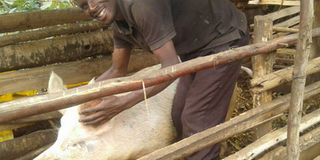Mixed farming makes him a millionaire

Ayebare’s piggery thrives alongside his other enterprise. Photo by Denis Bbosa
What you need to know:
- After starting with capital of as little as Shs50, 000, Julius Ayebare’s farm in Kabale is now earning Shs60m, per season, writes Denis Bbosa
After a futile search for a white collar job all-over the country, Julius Ayebare, a business accountant from Kabale University, decided to attend a developmental seminar at Uhuru Institute in Tororo.
The youth training camp instilled virtues of financial literacy, agriculture and social development into the participants, and Ayebare was one of the first beneficiaries.
“At the end of the seminar, we were given Shs50, 000 as transport refund but I decided to use mine to buy two rabbits, a cock and a hen to start my ‘farm’ in Rubanda Dstrict,” Ayebare recalls.
This was 2007, and all his plans were premised on his parents’ small piece of land in Katarama parish.
“I was particularly inspired by the Uhuru organisation CEO, Bernard Okello who practiced what he preached.”
Gradually, Ayebare’s initial investment has multiplied into colony of over 200 rabbits and flock of chicken hence turning into a big farm.
The 31-year-old old has bought himself three acres of land for apiary (bee keeping), passion fruits, pine trees and Irish potatoes.
Reaping Shs5m a month
In total, Ayebare used close to Shs500, 000 to beef up his mixed farm.
He divided his three acres into four sections. Passion and Irish potatoes in one and half acres each. Then rabbit and apiary (beekeeping) on half an acre each.
“With certified inputs, consultation from agricultural extension officers as well as visiting demonstration farms and agricultural shows, I have witnessed good harvest,” he said.
In 75 days after planting, Ayebare would start harvesting his Irish potatoes. His one and half acre carries more than 1, 000 heaps of Irish, which he will harvest in two phases.
The main markets for his potatoes are Mbarara, Masaka and Kampala. However, Ayebare says some of the Irish potatoes are sold within Kabale District and nearby town councils.
A bagful of Irish potatoes of 100 kilogrammes costs Shs150, 000. During abundant rain Ayebare harvests up to 50bags of 100kilogrammes each. This translates to Shs7.5m gross income.
He harvests five to six bags of purple passion fruits, which he sells for between Shs300, 000 and Shs350, 000 a bagful to make close to Shs2.5m net income. The harvest depends on the rain, fertiliser input and good farming technics like weeding and pruning.
Beekeeping, rabbits rearing and poultry is another big catch of cash for Ayebare.
“When I add the money I get from selling 20 rabbits (each at Shs20, 000), Irish potatoes (a bag goes for Shs150, 000) and honey from my over 60 beehives, I earn about Shs5m after offsetting the expenses,” he says.
With his close to Shs60m in about five months, Ayebare is glad that he is able to manage his bills and school fees for his siblings. This has also seen him become one of the most talked about agriculture entrepreneurs in the area.
“I dedicate my entire day to the farm with my five workers. On a good harvest, I sell five bags of passion fruit at Shs300, 000 each which is Sh1.5m.”
Among the many produces on his mixed farm, bee keeping seems to be the most lucrative yet it comes with challenges.
“I started out with five hives and kept on expanding the hives to 60 to collect more honey. I can harvest like 50 kilogrammes and sell each at Shs10, 000 but there are times when locals disrupt the bees by stoning them and I end up making loses,” he reveals.
“I’m learning modern safety measures to stop these invasions.”
The proceeds from his blossoming ventures have greatly uplifted the livelihood of his parents and siblings as he is still single.
“I pay school fees for my siblings and a couple of other disadvantaged village children,” Ayebare says.
“Looking back, I did not envisage Shs50, 000 could transform me into a millionaire who is today worth Shs60m.”
He is still resisting the allure of partnering with government programmes like Operation Wealth Creation – because he feels he has the capacity to carry on alone.
Need for machines
As the trends and competition keep on changing, Ayebare, like other rural farmers cannot run away from the need to have processing machines for their raw products.
“I’m in the process of acquiring a filtering machine for honey so that we sell beyond our local market. As we grow, we want to start processing the passion fruit juice for the bigger market and all that is still held back by lack of funds.”
His cattle herd also rakes in money from milk but need boosting to start supplying beyond Rubanda and Kabale districts.




